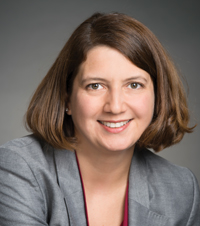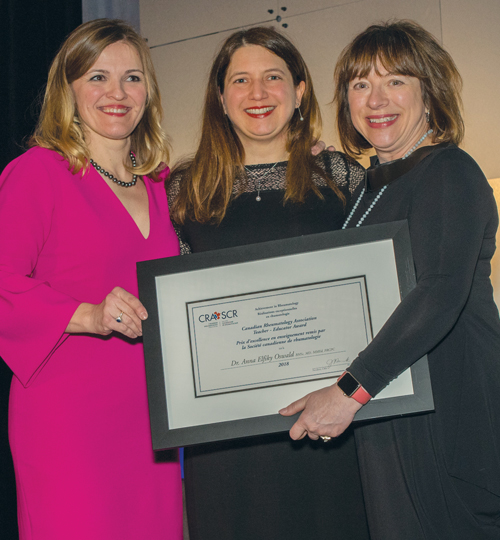Summer 2018 (Volume 28, Number 2)
Teacher-Educator:
Dr. Anna Elfiky Oswald
Download PDF

What do you believe are the qualities of a good educator? How do these apply to you?
I think a good educator is someone who has a long-term goal in mind, but is flexible enough to try different approaches based on the situation in front of them. I’m a real believer in teaching on the fly as we’re running around looking after patients, using “justify” and “what if” types of questions. In the long game I want to make sure the students have the lifelong learning skills to identify problems that stump them in their practice and figure out a way to work it out using literature, resources and colleagues around them. I think teachers need to be willing to be vulnerable, to show their learners what staff do when things don’t go their way or they don’t know what is going on with a patient. That way we can all learn together.
Can you recall a teacher in your own past who inspired you and directed your own course into medical education?
I can think of so many, so it is hard to narrow it down. To name a few, I would say Evelyn Sutton who really took me under her wing and showed me how to be a great rheumatology educator; Steve Aaron who took the time and effort to share his network and link me with key players in the medical education field so I could thrive; and Paul Davis who gave me the courage to pursue my path in medical education as an academic career in a traditional research heavy university.
What was your first thought when you learned that you would receive this award?
I was truly delighted with the news, honoured to be joining the group of amazing educators who received this award before me, and grateful for the support of my colleagues here in Edmonton and nationally.

Dr. Anna Oswald receiving her award from Dr. Joanne Homik and Dr. Stephanie Keeling.
You hold a number of teaching and leadership positions. You are Clinician Educator for the Royal College of Physicians and Surgeons of Canada. At the University of Alberta, you are the Director of Competency-based Medical Education for the Faculty of Medicine and Dentistry (FoMD), as well as a coordinator for the Masters in Health Professions Education Curriculum Design course, and a co-director of pre-clerkship education for the MD program.
What aspects of teaching do you appreciate the most?
My favourite part of teaching is getting to know my students and residents over time and watching them at their “aha” moments as things start to click for them.
Can you tell us more about competency-based medicine?
Sure, competency-based medical education in residency is an approach to clinical training where training expectations are clearly linked to the skills needed in independent practice, where training experiences are organized progressively to allow residents to build on their existing skills, where clinical teachers give residents regular feedback to help them successfully acquire the skills, and then where teachers check if they actually can do what they are supposed to be able to do. For current teachers and programs that already give regular specific actionable feedback about how residents can improve their skills in the workplace and check that they have the skills they need, it won’t be a huge shift, but for others I think it will really improve how we teach residents.
Given your extensive work in medical education, where do you anticipate medical education moving within the next decade?
I think in the next decade we’ll see a lot more call for social accountability. In other words, I think there will be increased emphasis to ensure our graduates have the skills that are needed by the public and that they serve a larger range of our communities.
As a respected teacher-educator, what would your advice be to a prospective rheumatologist?
My biggest advice is to think carefully about the aspects of your job that you have enjoyed the most and then expand that area as a focus for your career – loving your job and looking forward to each day is an opportunity that is worth pursuing.
You are marooned on a desert island? What book would you like to have on hand with you?
Probably “Boat Building 101.”
If you had an extra hour each day, how would you spend it?
Playing with my kids – tickle fights, dolls, board games, badminton, basketball, cards (but not Pokemon cards, I stink at that no matter how many times they try to teach me).
Anna Elfiky Oswald, MD, FRCPC
Associate Professor,
Division of Rheumatology
Department of Medicine
University of Alberta
Edmonton, Alberta
|
